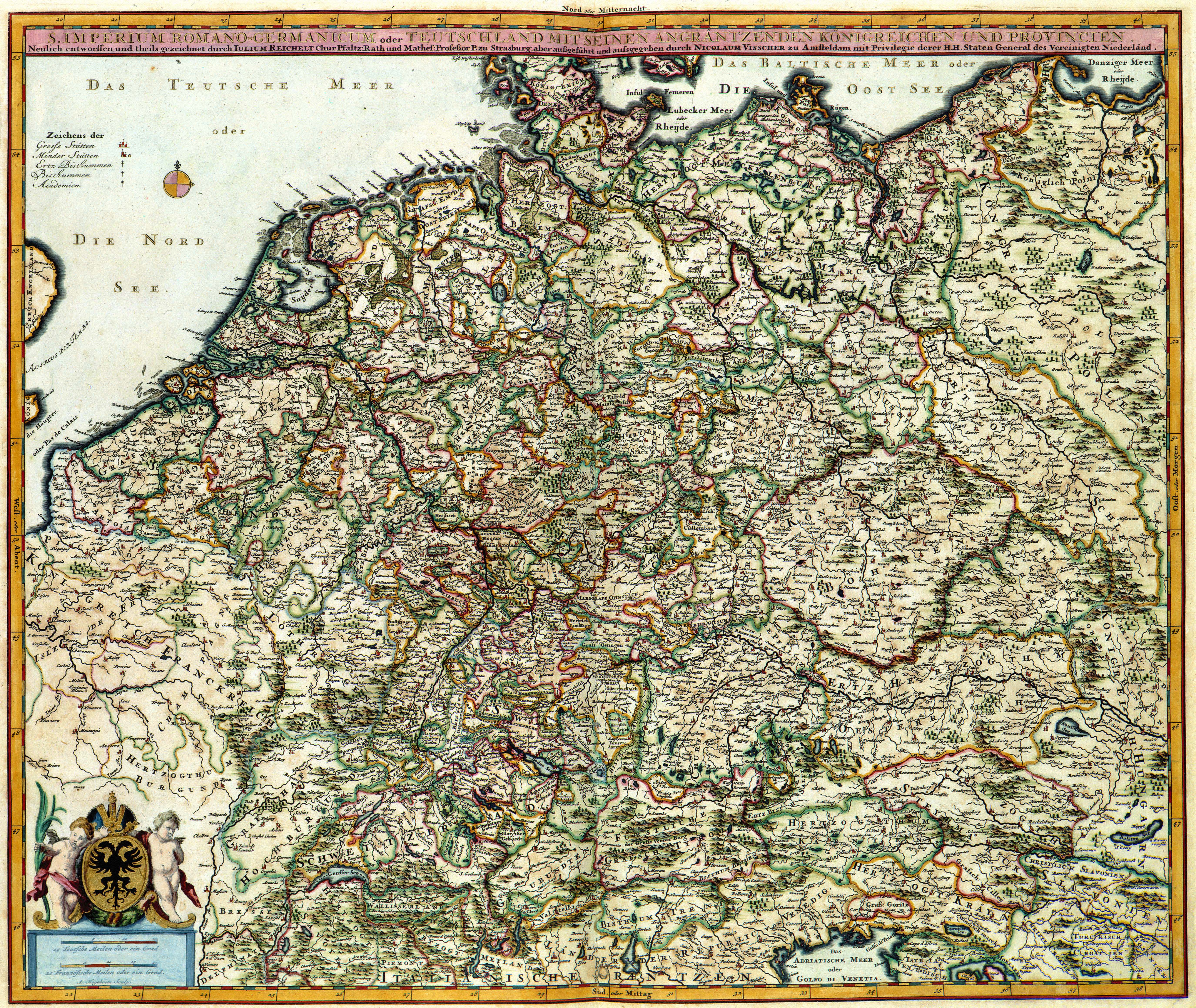
History of North Rhine-Westphalia
North Rhine-Westphalia was established by the British military administration's "Operation Marriage" on 23 August 1946 by merging the Rhine Province with the Province of Westphalia. On 21 January 1947, the former Free State of Lippe was merged with North Rhine-Westphalia.[1]
Julius Caesar[edit]
At around 55BC, the time of Julius Caesar, the territories west of the Rhine in this region were occupied by the Eburones, one of the tribes he identified as "Germani cisrhenani", who lived within the part of Gaul associated with the Belgae. Caesar reports that he tried to annihilate the Eburones and their name. Once part of the Roman empire, their country was occupied by a Germanic tribe with a different name, the Tungri. However, Tacitus reported that "Tungri" was a new name for the original "Germani", stating that in fact the first tribal group to be called by that name were the ones from west of the Rhine.[2] (Although the term "Germani" was used, and Caesar and other Roman historians clearly reported that there was kinship with tribes East of the Rhine, there is evidence that these early tribes on both sides of the Rhine used Celtic languages.)
Of the related tribes on the eastern bank of the Rhine, Caesar reported the Ubii, who were already requesting permission to migrate over the Rhine as they later would, near modern Cologne, and the Sugambri, who lived to the north of them near the modern Rhine-Ruhr area. Both tribes were under pressure from Suebi who had moved into the region to their east, and while he was in the area a major migration occurred under this pressure, with large numbers of Usipeti and Tencteri moving into the area near the Sugambri, and eventually attempting to cross the Rhine near where it joins the Maas, only to be pushed back aggressively by Caesar. They were still to be found near the eastern banks of the Rhine during imperial times.
Roman Empire and the Franks[edit]
Julius Caesar conquered the tribes on the left (western) bank of the Rhine, and Augustus established numerous fortified posts along it, but the Romans never succeeded in gaining a firm footing on the right bank. During imperial times all or most of North Rhine-Westphalia west of the Rhine was split out from Belgica as a frontier province, Germania Inferior, and there were new settlers brought into the area, some from across the Rhine such as the Ubii. The Ubii's region including modern Neuss, Cologne and Bonn, was called the "Civitas Ubiorum" and apparently also included the Sunuci. The Cugerni, who lived in the "Civitas Traiana" near Xanten during imperial times, are often thought to be Sugambri who had been resettled by the Romans west of the Rhine. Also living in the Traiana were the Betasii. (The other parts of Germania Inferior were mainly in the areas of modern Belgium and the Netherlands.)
East of the Rhine, Roman historians such as Tacitus report that to the north of the Sugambri were also the Bructeri, who pushed further south into the Sugambrian area during imperial times, under pressure from their northern neighbours the Chamavi and Angrivarii. North of them, in turn, and probably still in Westphalia, were the Chasuarii and Dulgubnii. Another tribe living east of the Rhine near the Sugambri, possibly as a sub-tribe, were the Marsi. The Usipetes who Caesar had reported as arriving in the area in his time stayed in the region north of the Rhine near where it joins the Maas, while the Tencteri moved into the area vacated by the Ubii, facing Cologne.
Around 1 A.D. there were numerous incursions through Westphalia and perhaps even some permanent Roman or Romanized settlements. The Battle of Teutoburg Forest took place near Osnabrück (as mentioned, it is disputed whether this is in Westphalia) and some of the tribes who fought at this battle came from the area of Westphalia.
By late Roman times it appears that whatever remained of these tribal groupings began to be referred to as the Franks, who were being pressed from the North by the Saxons. As the power of the Roman empire declined the Franks crossed the Rhine. For example, the Chattuari moved from somewhere near the Chamavi, into the area around Xanten, as well as the area previously inhabited by the Sugambri. By the end of the 5th century, Franks had conquered all the left bank lands of North Rhine-Westphalia, but Saxons were pushing into Westphalia, the name of which has its origins as one of the original main parts of their territory.
By the 8th century the Frankish dominion was firmly established in most of western Germany and northern Gaul.[3] Lasting hegemony over the Saxons, including those in Westphalia, was achieved in the 9th century by Charlemagne in the Saxon wars.
Middle Ages[edit]
Parts of Westphalia came under Brandenburg-Prussian control during the 17th and 18th centuries, but most of it remained divided duchies and other feudal areas of power. The Peace of Westphalia of 1648, signed in Münster and Osnabrück, ended the Thirty Years' War. The concept of nation-state sovereignty resulting from the treaty became known as "Westphalian sovereignty".
Creation of the state[edit]
North Rhine-Westphalia was established by the British military administration's "Operation Marriage" on 23 August 1946.[1]
Originally, it consisted of Westphalia and the northern parts of the Rhine Province, both formerly part of Prussia. On 21 January 1947, the former state of Lippe was merged with North Rhine-Westphalia.[1] The constitution of North Rhine-Westphalia was then ratified through a referendum.